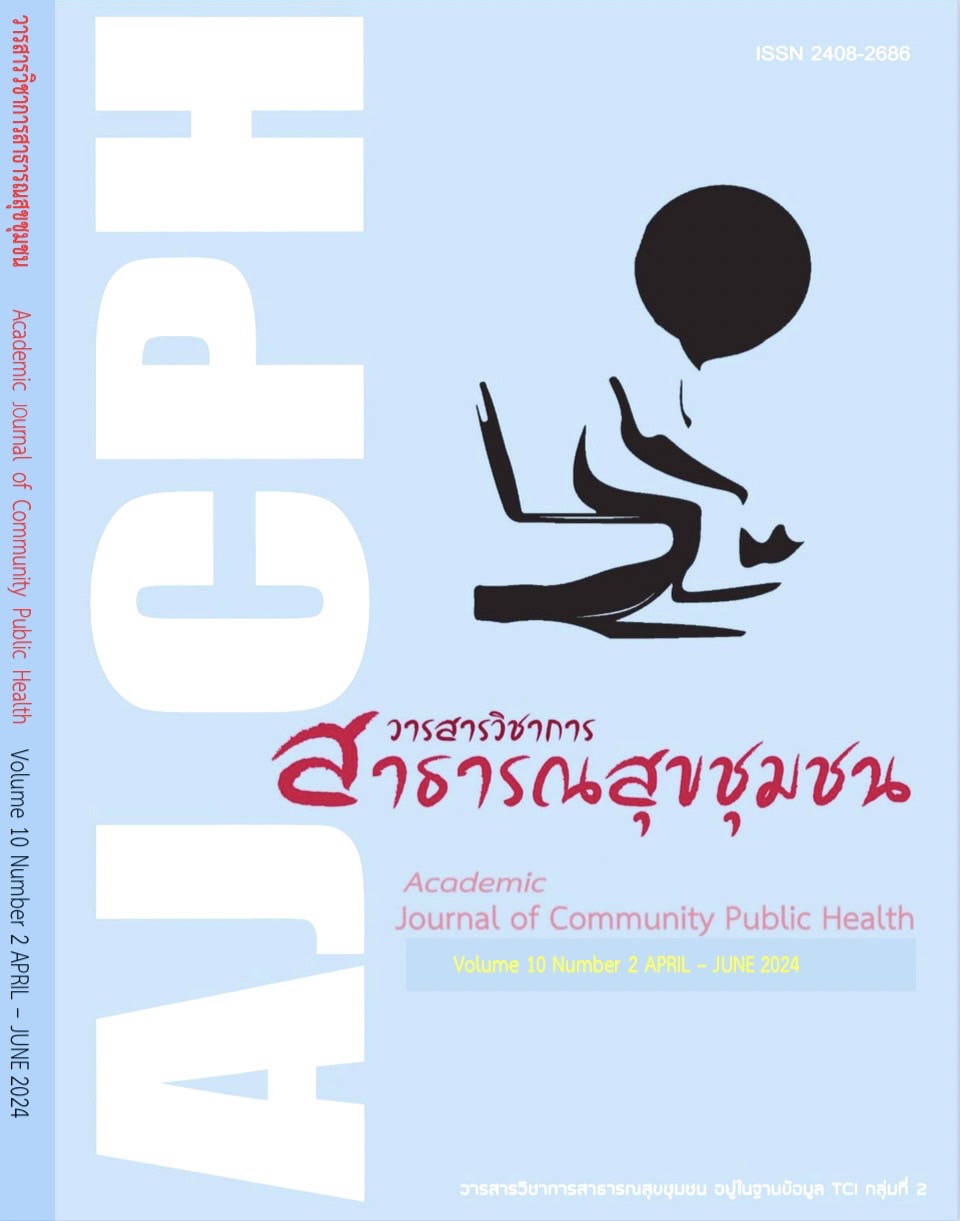Effects of FAVIPIRAVIR Monitoring Program of COVID-19 Infected Patients in Fort Pichai Dab Hak Hospital, Uttaradit Province
Keywords:
Favipiravir monitoring program, Covid-19 patients, Medical professional teamAbstract
This study is a quasi-experimental one groups pre-post test design. The research aimed to study the effects of Favipiravir Monitoring Program of Covid-19 Patients in Fort Pichai Dab Hak Hospital, Uttaradit Province, between 1st February and 30th April 2022. The sample was 1) COVID-19 patients, aged 18 years and over, 2) diagnosed by RT-PCR, with mild – moderate symptoms and 3) was treated with FAVIPIRAVIR. The sample size was 271 people. The research tool was the Favipiravir Monitoring Program was created by the researcher consisted of FAVIPIRAVIR Knowledge Questionnaires, Medication behavior record, Medication error record and User Satisfaction Survey. The data were analyzed by using percentages, means, standard deviations and paired-samples t-test.
The results of the study showed that 271 patients infected with the novel coronavirus (2019-nCoV) after using the Favipiravir Monitoring Program had significantly higher average scores of Favipiravir knowledge than before receiving the FAVIPIRAVIR Monitoring Program (p<.05). There were 239 participants (88.19%) who recorded completed Medication behaviors and 31 participants (11.44%) reported incomplete Medication behaviors. No medication errors were found after finished program. Monitoring for Favipiravir side effects of 20 patients (7.38%) were nausea, vomiting and diarrhea, respectively. The satisfaction of participants were at the high level ( =4.70, S.D.=0.43). The Favipiravir monitoring program provides patients with knowledge about Favipiravir. This program gives patients confidence to takeing medicine. Encourage patients to take medicine correctly and benefit patients.
References
ศูนย์ปฏิบัติการภาวะฉุกเฉิน กรมการแพทย์. แนวทางเวชปฏิบัติการวินิจฉัย ดูแลรักษาและป้องกันการติดเชื้อในโรงพยาบาล กรณีโรคติดเชื้อไวรสโคโรนา 2019 สำหรับแพทย์และบุคลากรสาธารณสุข [อินเตอร์เน็ต].2564 [เข้าถึงเมื่อ 7 สิงหาคม 2564]. เข้าถึงได้จาก: https://ddc.moph.go.th/viralpneumonia/file/situation/situation-no576-010864.pdf.
โรงพยาบาลค่ายพิชัยดาบหัก. รายงานสถานการณ์จำนวนผู้ป่วยติดเชื้อไวรัสโคโรนา 2019 ของโรงพยาบาลค่ายพิชัยดาบหัก มณฑลทหารบกที่ 35. อุตรดิตถ์: โรงพยาบาลสนามกองทัพบก มณฑลทหารบกที่ 35; 2564.
นงลักษณ์ สุขวาณิชย์ศิลป์. การค้นคว้ายาต้านไวรัสโควิด-19 ตอนที่ 1 : ฟาวิพิราเวียร์ (Favipiravir) [อินเตอร์เน็ต]. 2564 [เข้าถึงเมื่อ 7 สิงหาคม 2564]. เข้าถึงได้จาก: https://pharmacy.mahidol.ac.th/th/service-knowledge-article-info-old.php?id=485.
กรมการแพทย์. แนวทางเวชปฏิบัติ การวินิจฉัย ดูแลรักษา และป้องกันการติดเชื้อในโรงพยาบาลกรณีโรคติดเชื้อไวรัสโคโรนา 2019 (COVID-19) สำหรับแพทย์และบุคลากรสาธารณสุข [อินเตอร์เน็ต]. 2564 [เข้าถึงเมื่อ 7 สิงหาคม 2564]. เข้าถึงได้จาก: https://covid19.dms.go.th/backend/ Content/Content_File/Covid_Health/Attach/25640721115923AM_CPG_COVID_v.16.4.n.pdf.
พรรณี ลีลาวัฒนชัย และธนานันต์ ตัณฑ์ไพบูลย์. Favipiravir สำหรับรักษาโรคติดเชื้อไวรัสโคโรนา 2019. วารสารเภสัชกรรมโรงพยาบาล. 2564;31(2):3-8.
วัลลภ รัฐฉัตรานนท์. การหาขนาดตัวอย่างที่เหมาะสมสําหรับการวิจัย: มายาคติในการใช้สูตรของ ทาโร ยามาเน และเครจซี-มอร์แกน. วารสารสหวิทยาการวิจัย. 2562; 8(1):11-28.
ชัยพร สุวรรณประสพ. การพัฒนาเว็บแอปพลิเคชันวีดีทัศน์ปฏิสัมพันธ์ เพื่อการเรียนรู้สำหรับนิสิตระดับปริญญาตรีมหาวิทยาลัยศรีนครินทรวิโรฒ. [ปริญญานิพนธ์ สาขาวิชาเทคโนโลยีการศึกษา]. กรุงเทพฯ: มหาวิทยาลัยศรีนครินทรวิโรฒ; 2561.
นิยดา เกียรติยิ่งอังศุลี. เภสัชกรกับการจัดการระบบยาและระบบสุขภาพในสถานการณ์การรระบาดของโควิด-19 [อินเตอร์เน็ต]. 2564 [เข้าถึงเมื่อ 7 สิงหาคม 2564]. เข้าถึงได้จาก: https://www.thaidrugwatch.org/download/series/48/series48-04.pdf.
ปริตรตา ไชยมล, สงวน ลือเกียรติบัณฑิต และวรนุชแสงเจริญ. ผลของการให้ความรู้โดยเภสัชกรร่วมกับการใช้ภาพถ่ายแสดงวิธีการใช้ยาสำหรับผู้ป่วยโรคเบาหวาน. วารสารเภสัชกรรมไทย 2560;9(2):475-488.
กนกพรรณ นิกรเพสย์ และสุธาทิพย์ พิชญไพบูลย์. ผลการให้คำปรึกษาโดยเภสัชกรร่วมกับการติดตามทางโทรศัพท์ในผู้ป่วยกลุ่มอาการเมแทบอลิก. วารสารเภสัชกรรมไทย 2561;10(2):449-461.
Gulhan R., et al. Pharmacokinitic characterization of favipiravir in patient with COVID-19. Br J Clin Pharmacol 2022;88(7):3516-3522.
Abdur Rahman S.M., et al. Safety and efficacy of favipiravir for the management of COVID-19 patients: A preliminary randomized control trial. Clinical Infection in Practice 2022;15:2590-1702.
ชมพูนุช พัฒนจักร. ความร่วมมือในการใช้ยาของผู้ป่วยสูงอายุโรคเรื้อรัง ในเขตพื้นที่บริการโรงพยาบาลส่งเสริมสุขภาพตำบลลาดพัฒนา อำเภอเมือง จังหวัดมหาสารคาม. วารสารโรงพยาบาลมหาสารคาม 2562;16(3):13-22.
จุธาดา สุวรรณธารา และอารีนา น้อยนงเยาว์. แอปพลิเคชันแจ้งเตือนการบริหารยา [ปริญญานิพนธ์ สาขาวิชาเทคโนโลยีสารสนเทศ]. กรุงเทพฯ: สถาบันเทคโนโลยีพระจอมเกล้าเจ้าคุณทหารลาดกระบัง; 2561.
Wanitchaya Yuenyong, Sarayut Nontakhamcher, Kitiya Polyotha, Sasiwimol Peethong and Songkran Chanchalanimitr. Medication Reminder Application. Payap University and UNRN Research Symposium 2022; 2022: 314-323.
Suthida Nakhornriab, Doungrut Wattanakitkrileart, Vishuda Charoenkitkarn, Songkram Chotikanuchit and Vajirasak Vanijja. The Effectiveness of Mobile Application on Medication Adherence in Patients with Stroke. Journal of nursing science 2017;35(3):58-69.
ศานตมล เสวกทรัพย์, สงวน ลือเกียรติบัณฑิต และ ศิราณี ยงประเดิม. ผลการใช้โทรศัพท์ติดตามเพื่อลดปัญหาความไม่ร่วมมือในการใช้ยาอะม็อกซีซิลลินชนิดรับประทาน. วารสารเภสัชกรรมไทย 2555;4(1):17-27.
ธีวรา โลมรัตน์ และตุลาการ นาคพันธ์. การประเมินประสิทธิพลของยาฟาวิพิราเวียร์ในผู้ป่วยโควิด-19 ที่รับการรักษาในโรงพยาบาลกุดข้าวปุ้น จังหวัดอุบลราชธานี. วารสารสุขภาพและสิ่งแวดล้อม 2565;7(2):8-18.
Kaur R.J., et al. Favipiravir Use in COVID-19: Analysis of Suspected Adverse Drug Event Reported in the WHO Database. Infect Drug Resist 2020;2020(13):4427-4438.
โรงพยาบาลรามาธิบดี มหาวิทยาลัยมหิดล. รู้จักกับยาฟาวิพิราเวียร์ [อินเตอร์เน็ต]. 2563 [เข้าถึงเมื่อ 7 สิงหาคม 2564]. เข้าถึงได้จาก: https://www.rama.mahidol.ac.th/atrama/issue041/rama-rdu



